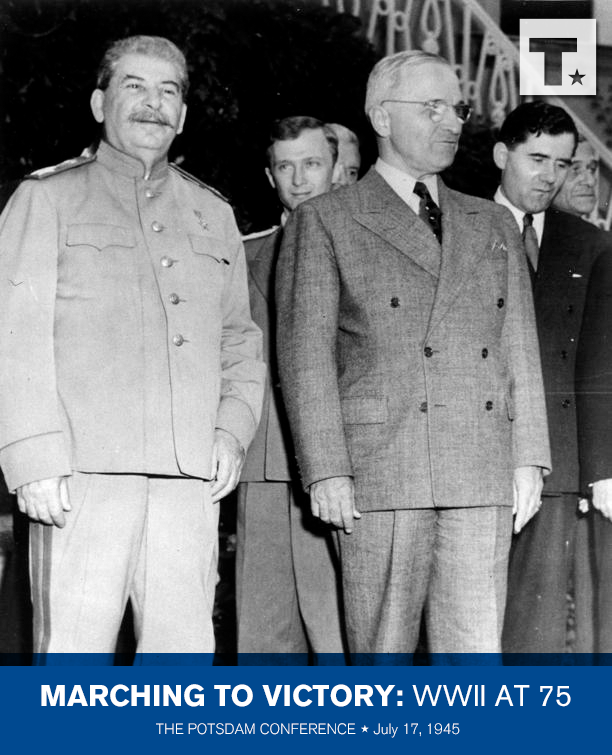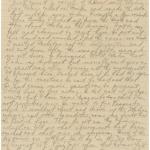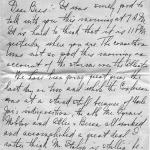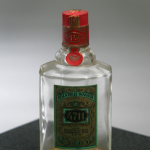WWII 75: Marching to Victory | July 17, 2020

WWII highlights from the Truman Library’s archives and collections
Marching to Victory: The Potsdam Conference
July 17, 1945
What do you do when you’re about to win a war and your mightiest ally seems just as dangerous as your enemies?
This question loomed large for President Harry Truman when he met with Soviet leader Joseph Stalin for the first time on July 17, 1945.
With Germany defeated and occupied, heads of the “Big Three” Allied nations — the United States, the Soviet Union and Britain — had begun a 16-day conference in Potsdam, Germany, to decide the fate of war-torn Europe. While the world’s most powerful leaders were allies, they held opposing views on the shape of a post-war world.
Truman walked a tightrope at Potsdam. He was growing suspicious of Stalin’s intentions in Europe and needed to take a tough stance against the Soviet suggestion that Germany be completely disarmed. At the same time, President Truman wanted Stalin’s support in ending the war with Japan.
How could this new American president — who lacked any real experience in international relations — hope to achieve such a balancing act? Three items in the collections of the Truman Library and Museum provide insights into the president’s diplomacy during those momentous days in Potsdam: a diary entry, a letter, and a cologne bottle.
DIPLOMATIC HOPES: TRUMAN’S DIARY ENTRY, JULY 17, 1945
 After his initial meeting with Joseph Stalin, Truman privately expressed relief in his diary:
After his initial meeting with Joseph Stalin, Truman privately expressed relief in his diary:
“Promptly a few minutes before twelve I looked up from the desk and there stood Stalin in the doorway. I got to my feet and advanced to meet him. He put out his hand and smiled. I did the same….After the usual polite remarks we got down to business. I told Stalin that I am no diplomat but usually said yes or no to questions after hearing all the argument. It pleased him. I asked him if he had the agenda for the meeting. He said he had and that he had some more questions to present. I told him to fire away. He did and it is dynamite — but I have some dynamite too which I’m not exploding now….I can deal with Stalin. He is honest — but smart as hell.”
Despite the success of this first meeting, negotiations at Potsdam set the stage for a long and precarious Cold War.
UNCLE JOE’S INDISPOSITION: HARRY’S LETTER TO BESS, JULY 31, 1945
 “We have been going great guns the last day or two,” Truman wrote to Bess two weeks into the Potsdam Conference. Although “the Conference was at a standstill because of Uncle Joe’s indisposition,” the Western Allied negotiators “all worked and accomplished a great deal….I rather think Mr. Stalin is stallin [sic]….The whole difficulty is reparations. Of course the Russians are naturally looters and they have been thoroly [sic] looted by the Germans over and over again and you can hardly blame them for their attitude….”
“We have been going great guns the last day or two,” Truman wrote to Bess two weeks into the Potsdam Conference. Although “the Conference was at a standstill because of Uncle Joe’s indisposition,” the Western Allied negotiators “all worked and accomplished a great deal….I rather think Mr. Stalin is stallin [sic]….The whole difficulty is reparations. Of course the Russians are naturally looters and they have been thoroly [sic] looted by the Germans over and over again and you can hardly blame them for their attitude….”
Truman’s letter also reveals the toll that long diplomatic engagements have on those involved. “I’ll sure be glad to see you and the White House and be where I can at least go to bed without being watched,” he wrote to Bess.
DIPLOMACY IN THE AIR: A COLOGNE BOTTLE
 One of Truman’s aids brought home a small souvenir from the tense negotiations: a bottle of German cologne. After returning to his Potsdam apartment from a meeting, Truman discovered the cologne in his bathroom. The Soviets, who were hosting the conference in a section of Germany they controlled, left the gift for President Truman. Upon discovering the bottle, President Truman emerged from the bathroom holding the bottle and grinning. “‘It looks like the Russians are trying to make a German stinker out of me,” he quipped. In the midst of difficult negotiations, President Truman kept his sense of humor.
One of Truman’s aids brought home a small souvenir from the tense negotiations: a bottle of German cologne. After returning to his Potsdam apartment from a meeting, Truman discovered the cologne in his bathroom. The Soviets, who were hosting the conference in a section of Germany they controlled, left the gift for President Truman. Upon discovering the bottle, President Truman emerged from the bathroom holding the bottle and grinning. “‘It looks like the Russians are trying to make a German stinker out of me,” he quipped. In the midst of difficult negotiations, President Truman kept his sense of humor.
More to Explore
- Read Truman’s July 17, 1945 diary entry.
- Read Truman’s July 31, 1945 letter to Bess.
- Relive history in The White House Decision Center. Step back to 1945 and into the roles of President Truman, J. Robert Oppenheimer and other West Wing advisors. How will WWII end? You decide.
- Stay tuned for more Potsdam later this month!
Marching to Victory
75 years ago, World War II ended under President Truman’s decisive leadership. Now, follow key events from the war’s final months with the Truman Library Institute’s series, “Marching to Victory: WWII Highlights from the Truman Library’s Archives and Collections.” The 25-part blog series opens the vaults at Truman’s presidential library to share eyewitness accounts and historic artifacts related to major conflicts and monumental victories – from the Battle of the Bulge to the liberation of Dachau to the unconditional surrender of Japan.
More in this series:
Marching to Victory: The Bombing of Dresden
Marching to Victory: The Yalta Conference
Marching to Victory: The Battle of the Bulge
Marching to Victory: The Tokyo Fire Raids
Marching to Victory: The Battle of Okinawa
Marching to Victory: The Liberation of Buchenwald
Marching to Victory: “The President is Dead”
Marching to Victory: The Liberation of Dachau
Marching to Victory: The Death of Adolf Hitler
Marching to Victory: Germany Surrenders!
Marching to Victory: Victory Gardens
Marching to Victory: Civil Rights
Marching to Victory: The United Nations
Marching to Victory: How Children Helped Win the War
Marching to Victory: The First Atomic Bomb Test
Contributed by Will Hickox, Ph.D. He has written for The New York Times and contributed to several digital history projects.
Join our email list to receive Truman updates right in your inbox:



